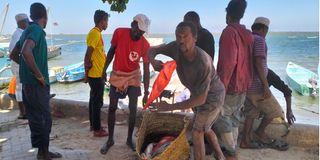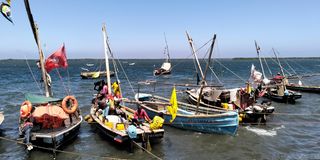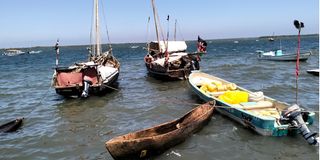Premium
A cry from the ocean: How Lamu port dredging killed fishing and snorkeling
The sun is about to rise in Lamu and from a distance, fishermen navigate their wooden boats. For many years, they eked a living from catching fish, lobsters and seaweeds in the Kililana-Manda-Toto, Manda Bruno, and Mkanda channels, as well as the fishing grounds within the Mtangawanda area.
However, since dredging took place to allow the construction of the Lamu port some years back, most have been rendered jobless from the destruction of the ecosystem.
Dredging prevents fishermen from operating their small boats because the water becomes turbulent.
It also affects breeding sites because as the dredging goes on, fish eggs are destroyed, meaning there is less catch.
The fishermen have complained of reduced fish stock believed to be the result of the Lamu Port dredging that has in turn resulted in invisibility in the water.

Fishermen in Lamu Old Town showing their little catch after a day's work. Fish stocks have reduced in recent times due to dredging for the construction of the Lamu Port.
Many times, fishing nets have ended up getting destroyed or catching the sediments and debris that were dredged up from the sea bed as a result of the digging for the first three berths at Lamu Port in Kililana, Lamu West.
Omar Malau says in recent times, the ocean water in most of the fishing channels bordering the Lamu Port has turned cloudy and dirty.
This, he says, hinders visibility, particularly for lobster divers.
“The water is always full of the sediments and debris resulting from the dredging. The situation is even worse during windy seasons. Prawns and lobster divers like us can’t see anything through the cloudy water,” says Malau.

Fishermen and their vessels going about their duties in the Indian Ocean waters in Lamu County.
Mohamed Ali from Manda Toto says their small boats and other vessels used to venture into the sea are not effective because the depth was increased, making the water rougher.
“This has affected even us fishermen who border the Lamu Port. Nowadays you can bear witness that the ocean is rough and experiencing strong tides and waves that make it impossible for us to fish while using small vessels. The rate of fishing boats getting involved in accidents at sea has also increased and it’s worrying,” says Ali.
Abubakar Twalib, the Amu Beach Management Unit (BMU) chairperson called on the government to speed up the release of the Sh1.76 billion compensation awarded to fishermen by a Malindi Court over the port’s construction, which affected their traditional fishing livelihood.
In May 2018, following a successful petition, the Malindi High Court ruled in favour of the 4,734 fishermen of Lamu, saying the port project had failed to meet basic constitutional and legal requirements.

Parked fishing boats in Lamu Old Town.
However, five years have passed without the fishermen receiving the money.
“Our hope is only pegged on the Sh1.76 billion compensation. We’ve witnessed lots of difficulties and frustrations in conducting fishing activities in the Lamu ocean waters since the Lapsset dredging took place. Our fishing has died. The only hope is for them to fast-track the release of the Lapsset fishermen’s compensation cash,” says Twalib.
Ahmed Bahero notes that the introduction of large sea vessels that have been docking at the port of Lamu since it was opened on May 20, 2021, has completely interrupted the fisheries ecosystem, leading to loss of fish through migration or outright decimation.
“The dredging that took place at the Lamu Port resulted in the cessation of our traditional fishing practices and traditional fishing channels that we heavily relied upon,” says Bahero.





